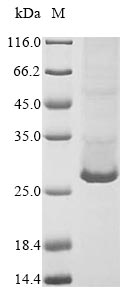Recombinant Mouse Complement C1q tumor necrosis factor-related protein 3 (C1qtnf3) is produced in a mammalian cell expression system, which appears to ensure proper folding and post-translational modifications. The protein is expressed as a full-length mature protein, spanning amino acids 23 to 246. It features an N-terminal 10xHis-tag for simplified purification. With a purity level exceeding 85% as determined by SDS-PAGE, this protein seems suitable for various research applications.
C1q tumor necrosis factor-related protein 3 (C1qtnf3) belongs to the C1q/TNF superfamily and is known to be involved in numerous biological processes. Research suggests it plays a role in inflammation and immune response regulation. The protein has also drawn interest in metabolic pathway studies. Its involvement in these pathways makes it a significant focus in research areas seeking to understand cellular communication and response mechanisms.
Potential Applications
Note: The applications listed below are based on what we know about this protein's biological functions, published research, and experience from experts in the field. However, we haven't fully tested all of these applications ourselves yet. We'd recommend running some preliminary tests first to make sure they work for your specific research goals.
Mouse C1qtnf3 is a secretory adipokine that requires proper folding, disulfide bond formation, and trimerization for its functional activity in metabolic regulation. The mammalian cell expression system provides the optimal environment for eukaryotic protein folding, post-translational modifications, and complex assembly. However, even in mammalian systems, protein folding is not guaranteed to be 100% correct. The N-terminal 10xHis tag is relatively small but may potentially interfere with the protein's N-terminal structural organization. While the probability of correct folding is high, experimental validation is essential to confirm functional trimerization and activity.
1. Antibody Development and Validation Studies
Antibody development can proceed based on sequence, but conformation-specific antibodies require proper trimerization validation.
If Correctly Folded (Verified): Excellent for generating conformation-sensitive antibodies that recognize native C1qtnf3 epitopes, particularly important for this trimeric protein.
If Misfolded/Unverified: Suitable for producing antibodies against linear epitopes, but these may not efficiently recognize the native trimeric structure in biological samples.
2. Protein-Protein Interaction Studies
C1qtnf3 interactions depend on a precise quaternary structure that must be confirmed experimentally.
If Correctly Folded (Verified): Highly suitable for identifying physiological binding partners (e.g., receptors, adipokine network proteins) with high confidence in interaction data.
If Misfolded/Unverified: High risk of non-specific binding or failure to interact; may produce biologically misleading results due to improper trimerization.
3. Biochemical Characterization and Stability Studies
These studies provide critical quality control data to determine folding status and trimerization capability.
If Correctly Folded (Verified): Essential for validating trimerization state, thermal stability, and structural integrity using techniques like SEC-MALS and CD spectroscopy.
If Misfolded/Unverified: Still valuable for assessing physical properties, but characterizes non-native protein structure.
4. Comparative Species Analysis
Valid comparative studies require the protein to be in its native trimeric conformation.
If Correctly Folded (Verified): Ideal for meaningful cross-species comparisons of structural stability, oligomerization behavior, and functional conservation.
If Misfolded/Unverified: Comparative analyses would yield misleading results, as differences may reflect misfolding rather than genuine evolutionary variations.
Final Recommendation & Action Plan
The mammalian expression system provides a high probability of correct folding for this adipokine, but experimental validation of trimerization and structural integrity is essential before reliable use in functional studies. The immediate priority is Application 3 (Biochemical Characterization) to assess trimerization state via size-exclusion chromatography with multi-angle light scattering (SEC-MALS) and validate structural integrity through circular dichroism spectroscopy. If correct folding and trimerization are verified, proceed confidently with Applications 1 (conformational antibodies), 2, and 4 for interaction studies, antibody development, and comparative analyses. If misfolding is detected, limit applications to linear epitope antibody production (Application 1) and basic biophysical characterization (Application 3), avoiding all functional interaction and comparative studies. For all applications, include appropriate controls and consider the potential need for tag removal if the His-tag interferes with trimerization. This systematic approach ensures appropriate use based on experimental validation of protein folding and oligomerization status.






